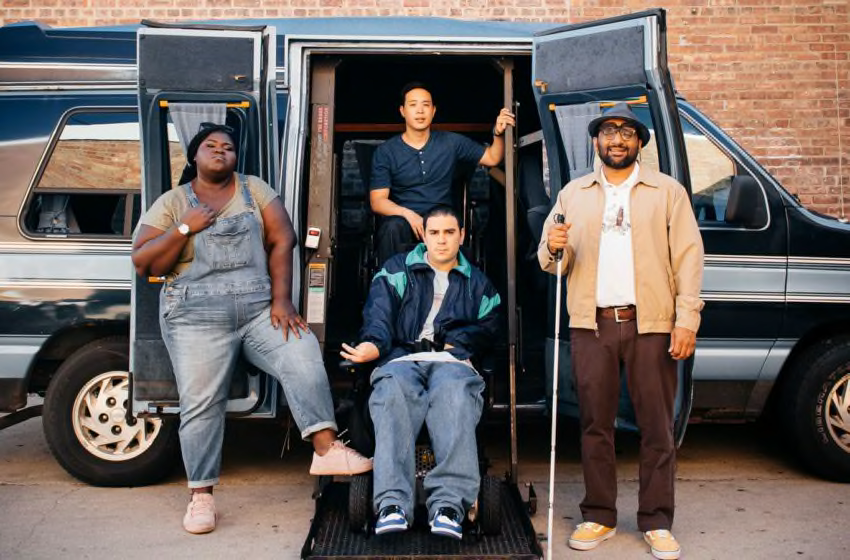#Stories about people with disabilities should star disabled actors

Table of Contents
“#Stories about people with disabilities should star disabled actors”

Come As You Are and the problem with casting disabled actors in disabled roles
Come As You Are is a film about three disabled men who embark on a road trip to a Canadian brothel to lose their virginity.
Although the film revolves around the lives of three disabled men, each of the film’s main characters are portrayed by able-bodied actors. While this may not seem like a huge deal to the casual viewer, it’s happened before. At this point, Hollywood seems to be implying that disabled people are unworthy of telling their own stories.
Stories about people with disabilities should star disabled actors
The film, which is a remake of a 2011 Belgian film and loosely-based on the true story of Asta Philpot, premiered at South By Southwest in 2019 before being released for digital download on July 17, just in time for the end of Disability Pride Month. As the announcement trailer made the rounds on Twitter, several disabled individuals criticized the film for its subject matter.
Honestly, the lack of disabled actors in that movie is the least of my concerns. A cringey movie perpetuating the idea that disableds are both extremely horny and extremely undesirable should’ve never been made in the first place. #ComeAsYouAreFilm
— Kristen Unsatisfied (@kdub155) July 12, 2020
also the whole “disabled people are all virgins, will only get sex if they pay for it and someone out of the goodness of their hearts will sleep with them for money, will always life with their parents who control them like children” storyline bores tf out of me
— paula ??♀️ (@whiskeyncokelwt) July 9, 2020
Grant Rosenmeyer, an executive producer for Come As You Are, and one of the film’s leads, was also criticized for his defense of director Richard Wong’s choice to cast able-bodied actors in disabled roles in an interview with Forbes in February.
Rosenmeyer told Forbes:
“To be clear, there are tremendous actors with disabilities, it wasn’t even about that. We had six months to put the film together because we couldn’t afford to pay for the option. The Belgians were like, “Okay, you can have it for six months and we’ll see if you can set it up in six months,” which, if you know anything about setting up a movie it’s normally an 18-month option.
So we had six months to find actors to play these roles who would be willing to do it, get the financing in place, and get get into production. I was told it couldn’t happen and it’s true.”
Rosenmeyer then went on to say that although the film features three disabled actors in various roles and Philpot makes a cameo, they struggled to secure funding for Come As You Are without the presence of “big-name actors” and were told the movie wouldn’t find a large enough audience.
“I sent this to over 100 production companies, the mini majors, and everybody was like, sorry, it’s either too small or there’s not enough of an audience for a story about disability and sex.
You have no stars with disabilities that you can put in and it’s like, well, yeah, you have to make them! Nobody’s gonna finance this thing without names and it’s like, alright, we’ll get some of the name-iest names we can get and create these opportunities to be inclusive and diverse.”
What representation means to a member of the disabled community
I’m 24-years-old, and I was born with a disability called Spina Bifida. I am paralyzed from the waist down and use a manual wheelchair. To be honest, representation was never something that I thought about growing up. It was not until I became a teenager that I began to realize the importance of accurate representation of people with disabilities in media.
My first brush with the feeling associated with seeing someone that was like me came in 2011 when I started watching Glee. While I had issues with the character of Artie, I loved seeing a character with a disability on a mainstream television program, and I loved that although the show occasionally addressed Artie’s disability, it wasn’t used as a plot device meant to inspire others.
He lived his life just like his able-bodied peers: joining clubs, hanging out with friends, and falling in and out of love. While I was never a huge Glee fan and stopped watching shortly after Cory Monteith’s death, I quickly began to understand why representation in media matters.
It’s a feeling that I would again experience when I began watching Breaking Bad, and when Speechless premiered on ABC, and The Fundamentals of Caring began streaming on Netflix.
It was the feeling that the world was starting to acknowledge that the stories of disabled individuals matter. However, of the three pieces of media that I mentioned, only Speechless and Breaking Bad feature a disabled character that’s portrayed by a disabled actor.
In fact, in 2016, Variety reported on a study that found that 95% of disabled characters on television were portrayed by able-bodied actors.
What failing to accurately represent disabled people in media implies
While I believe that the actor best suited for a role, should be chosen for a role, I reject the notion that able-bodied actors are best suited to tell the stories of disabled individuals. For the record, I also don’t believe that a disabled actor could convincingly portray an able-bodied character. By refusing to cast disabled actors, as Rosenmeyer, to his credit, says, Hollywood is refusing any chance to turn disabled actors into the bankable stars that Hollywood claims they need.
By claiming that a movie about disability and sex won’t find an audience, Hollywood implies that the only stories that are worth featuring disabled characters are ones where they’re the butt of a joke that they’re not in on as in Shallow Hal. They imply that the only stories worth featuring disabled characters are ones where their identity is meant to be a plot device through which their able-bodied peers gain a greater appreciation for life, as in A Walk To Remember.
They imply that the only stories worth featuring disabled characters are ones where they must come to terms with their disability as in The Upside or choose suicide such as in Me Before You.
In making that implication, they undermine any meaningful attempt to represent people with disabilities in media.
Do you agree? Sound off in the comments below!
If you want to read more Like this articles, you can visit our Social Media category.
if you want to watch Movies or Tv Shows go to Dizi.BuradaBiliyorum.Com for forums sites go to Forum.BuradaBiliyorum.Com



